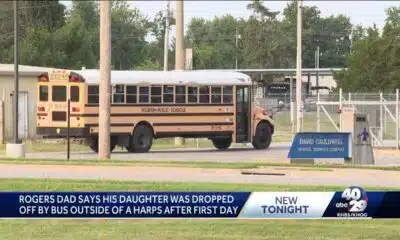News from the South - Alabama News Feed
States are telling sheriffs whether they can — or can’t — work with ICE
by Tim Henderson, Alabama Reflector
May 13, 2025
This story originally appeared on Stateline.
Local sheriffs are on the front lines in deciding whether to participate in the Trump administration’s mass deportation plans. But states increasingly are making the choice for them.
More and more, sheriffs’ hands are tied no matter whether they do — or don’t — want to help with deportations, though they often get the blame when conservatives draw up lists of sanctuary cities.
“‘Naughty lists,’ as we call them, are not super helpful here,” said Patrick Royal, a spokesperson for the National Sheriffs’ Association. “We all know there are places like Colorado where you can’t [help with deportations], and places like North Carolina where you have to.”
GET THE MORNING HEADLINES.
Cooperation between sheriffs and U.S. Immigration and Customs Enforcement lies at the heart of the Trump administration’s immigration detention policy. The administration plans to punish noncooperative jurisdictions with funding cuts — though many legal experts agree that cooperation is voluntary unless state or local laws say otherwise.
Sheriffs, who typically run local jails, must decide what to do when faced with immigration detainers — requests from ICE to hold onto incarcerated people up to two extra days so ICE officers can show up and arrest them. ICE issues those detainers when the agency reviews fingerprints sent electronically for background checks as part of the jail booking process.
Otherwise, arrested suspects who post bond or are otherwise released by a judge might go free despite their immigration status, prompting ICE in some cases to pursue them in the community.
In North Carolina, Sheriff Garry McFadden ran on a platform of limiting cooperation with ICE when he was elected in Mecklenburg County, home to Charlotte, in 2018. But today, McFadden must comply with detainers because of a state law passed last year.
In a now-retracted Facebook post, U.S. Sen. Thom Tillis in late April accused Mecklenburg and several other North Carolina counties of “shielding criminal illegal immigrants” as sanctuary jurisdictions. Tillis, a North Carolina Republican, said in the post he was writing federal legislation to prosecute sanctuary jurisdictions.
“You can’t say we’re a sanctuary county and have state laws that say we have to work with ICE. You can’t have both,” McFadden said. He added that he’d like more choice about whether to comply with detainers. A federal funding cutoff would endanger important jail programs such as rape counseling, he said.
“Everybody’s focused on immigration like that’s the biggest fire, and nobody wants to address the other things. The losers will be the prisoners who need all these services we provide,” McFadden said.
You can’t say we’re a sanctuary county and have state laws that say we have to work with ICE. You can’t have both.
– Sheriff Garry McFadden, Mecklenburg County, N.C.
Conservative sheriffs in Democratic-controlled states also can be frustrated by state policy on detainers. Sheriff Lew Evangelidis of Worcester County, Massachusetts, said he’s been criticized for releasing prisoners wanted by ICE but sometimes has no choice: A 2017 state Supreme Court ruling prohibits holding prisoners based on detainers.
“If they [ICE] want this person and consider them a threat to public safety, then I want that person out of my community. I want to keep my community safe,” said Evangelidis. He supported a Republican-sponsored effort in the state legislature to allow 12-hour holds for ICE if a judge determines the prisoner is a threat to public safety, but the amendment was voted down in April.
States act on detainers
Many experts agree that ICE detainers can be legally ignored if states allow sheriffs to do that.
“That detainer request is just that, a request, it’s not a requirement,” said Cassandra Charles, a staff attorney at the National Immigration Law Center, which is opposing Louisiana’s lawsuit to reverse a court-ordered ban on cooperation between Orleans Parish and ICE.
The general counsel for the North Carolina Sheriffs’ Association, Eddie Caldwell, agreed that the detainers are voluntary under federal law.
The association supports a state bill now under consideration that would require not only the 48-hour detention but also a notice sent 48 hours before release to let ICE know the clock is running. The proposal has passed the House.
The notification matters, Caldwell said, because there can be criminal proceedings that take weeks or months, so ICE in many cases doesn’t realize the 48-hour window has started.
Tillis’ office said the senator’s disagreement with McFadden, a Democrat, and other sheriffs is about that notification.
“It’s not necessarily that [sheriffs] are breaking the law, but rather making it as difficult as possible for ICE to take prisoners into custody by refusing to do some basic things. Notification is important,” said Daniel Keylin, a senior adviser to Tillis.
States including California, Colorado and Massachusetts ban compliance with the ICE detainers, on the general principle that it’s not enough reason to hold people in jails when they’re otherwise free to go because of bail or an end to their criminal cases. Those three states have made recent moves to defend or fine-tune their rules.
California’s attorney general also has issued guidance to local jurisdictions based on a 2017 state law limiting cooperation with immigration authorities. That law withstood a court challenge under the first Trump administration.
Colorado has a law against holding prisoners more than six hours longer than required, and a new bill sent to Democratic Gov. Jared Polis last week would specify that even those six hours can’t be for the purpose of an immigration detainer.
Iowa, Tennessee and Texas are among the states requiring cooperation with detainers.
And Florida has gone further, requiring sheriffs to actively help ICE write detainers though official agreements in which local agencies sign up to help enforce immigration laws.
Cooperation boosts arrests
Such cooperation makes a big difference, experts say — jails are the easiest place to pick up immigrants for deportation, and when local sheriffs and police help out, there are more arrests.
“A larger share of ICE arrests and deportations are happening in places where local law enforcement is cooperative with ICE,” said Julia Gelatt, associate director for the Migration Policy Institute’s U.S. Immigration Policy Program, speaking at a recent webinar.
“A declining share of arrests and deportations are happening from places like California, where there are really strict limitations on local law enforcement’s cooperation with ICE,” she added.
ICE is making about 600 immigration arrests daily, twice the rate as during the last year of the Biden administration, said Muzaffar Chishti, an attorney and policy expert at the Migration Policy Institute, speaking at the same event.
Reports on deportations are incomplete, Chishti said, but he estimated the current administration is on track to deport half a million people this year and is trying to get that number higher.
“The Trump administration has not been able to change the laws that are on the books, because only Congress can do that,” Chishti said. “It’s going to take congressional action for the Trump administration to achieve its aim of higher [arrest and deportation] numbers.”
President Donald Trump has added more pressure, last month requesting a list from Attorney General Pam Bondi and Homeland Security Secretary Kristi Noem of sanctuary cities, which he says would face funding cuts. The administration also has sued some states, including Colorado, Illinois and New York, over their policies.
Asked for comment on the legality of funding cutoffs for sanctuary policies, Bondi’s office referred to a February memo in which she promised to “end funding to state and local jurisdictions that unlawfully interfere with federal law enforcement operations.” The memo cites a federal law saying local officials “may not prohibit, or in any way restrict” communication about immigration status.
Local jurisdictions in Connecticut, Minnesota, New Mexico, Oregon and Washington joined a February lawsuit led by the city and county of San Francisco and Santa Clara County in California against a Trump administration executive order calling for defunding cities with sanctuary policies, calling the order “illegal and authoritarian.”
In April, a U.S. district court in California issued a preliminary injunction in that case preventing any funding cutoff over sanctuary policies to the cities and counties in the lawsuit. And on Friday, the federal judge, William Orrick, ruled that the injunction applies to any list of sanctuary jurisdictions the administration may target for funding cuts.
Trump’s new executive order seeking the list cannot be used as “an end run” around Orrick’s injunction, the judge wrote, while he decides the legality of detainer policies and other issues.
“The litigation may not proceed with the coercive threat to end all federal funding hanging over the Cities and Counties’ heads like the sword of Damocles,” Orrick wrote.
Stateline reporter Tim Henderson can be reached at thenderson@stateline.org.
Stateline is part of States Newsroom, a nonprofit news network supported by grants and a coalition of donors as a 501c(3) public charity. Stateline maintains editorial independence. Contact Editor Scott S. Greenberger for questions: info@stateline.org.
YOU MAKE OUR WORK POSSIBLE.
Alabama Reflector is part of States Newsroom, a nonprofit news network supported by grants and a coalition of donors as a 501c(3) public charity. Alabama Reflector maintains editorial independence. Contact Editor Brian Lyman for questions: info@alabamareflector.com.
The post States are telling sheriffs whether they can — or can’t — work with ICE appeared first on alabamareflector.com
Note: The following A.I. based commentary is not part of the original article, reproduced above, but is offered in the hopes that it will promote greater media literacy and critical thinking, by making any potential bias more visible to the reader –Staff Editor.
Political Bias Rating: Center-Right
The content leans towards a Center-Right perspective due to its focus on the Trump administration’s immigration policies, particularly emphasizing local law enforcement’s cooperation with ICE. The tone of the article is generally supportive of enforcement actions and policies that align with conservative views on immigration. It discusses the challenges faced by sheriffs who must decide whether to comply with federal detainer requests, and it highlights the role of conservative states and lawmakers in pushing for stricter immigration enforcement. While the article provides some context about the opposition, including legal challenges and resistance from Democratic-controlled states, it presents a clear focus on supporting immigration enforcement policies, which aligns with Center-Right positions. The content is not overtly partisan, but the framing suggests alignment with conservative priorities.
News from the South - Alabama News Feed
FBI raids Maryland home of Trump critic John Bolton
by Ariana Figueroa, Alabama Reflector
August 22, 2025
WASHINGTON — FBI agents raided the home and office of former Ambassador to the United Nations John Bolton, a one-time adviser to President Donald Trump who has become a frequent critic of the president, to investigate Bolton’s handling of classified documents, according to multiple media reports.
The raid on a former Trump adviser’s house represents an escalation from the Justice Department in targeting critics of Trump, whom he vowed to go after should he return to the White House for a second term.
Speaking to reporters Friday, Trump said he was not briefed on the raid of Bolton’s house in the wealthy suburb of Bethesda, Maryland, and office in Washington, D.C., according to White House pool reports.
But the president noted his longstanding feud with his former adviser.
“I’m not a fan of John Bolton,” Trump said. “He’s a real sort of a low life. He could be a very unpatriotic guy. We’re going to find out.”
Earlier this year, the president revoked the security detail for Bolton, who served as Trump’s national security advisor from 2018 to 2019 and as U.S. ambassador to the United Nations during the George W. Bush administration in 2005 and 2006.
Following his time in the Trump administration, Bolton, who was an important member of the Bush administration’s national security team that favored active military involvement in the Middle East, emerged as a chief Republican foreign policy critic of Trump, authoring a 2020 book that blasted the president and widened the public rift between the two men.
Bolton has not been charged with a crime and is not in custody, according to The Associated Press, which cited a person familiar with the matter.
The first Trump administration launched an investigation into Bolton to probe if he improperly used sensitive information in his book. The current search involves federal officials investigating Bolton’s actions over the last four years, according to the New York Times, which cited a federal law enforcement official.
Trump documents case
Trump himself was prosecuted for mishandling classified documents after the FBI raided his Florida golf course and main residence of Mar-a-Lago in 2022. A federal judge dismissed the resulting criminal charges against Trump.
FBI Director Kash Patel wrote on social media that “NO ONE is above the law,” and that FBI agents were “on mission.”
The FBI declined to comment.
In 2020, the Department of Justice opened a criminal investigation into Bolton’s book and tried to block its publication, but were stymied in court.
Patel also wrote a 2023 book where he lists Bolton, along with a dozen other people, as members of the “deep state” who are working against Trump, according to the Times.
Alabama Reflector is part of States Newsroom, a nonprofit news network supported by grants and a coalition of donors as a 501c(3) public charity. Alabama Reflector maintains editorial independence. Contact Editor Brian Lyman for questions: info@alabamareflector.com.
The post FBI raids Maryland home of Trump critic John Bolton appeared first on alabamareflector.com
Note: The following A.I. based commentary is not part of the original article, reproduced above, but is offered in the hopes that it will promote greater media literacy and critical thinking, by making any potential bias more visible to the reader –Staff Editor.
Political Bias Rating: Center-Left
This content presents a factual and detailed account of the FBI raid on John Bolton, a former Trump adviser turned critic, and provides context about Bolton’s history with Trump and his actions post-administration. It highlights the conflict between Trump and Bolton, includes direct quotes from Trump that are critical of Bolton, and references investigations into classified documents related to both men. While it covers perspectives from both sides and notes legal outcomes such as dismissed charges, it subtly emphasizes alleged abuse of power and retaliation by the Justice Department against Trump’s critics. This leads to a center-left lean, aiming for critical scrutiny of Trump and his administration while avoiding overtly partisan language.
News from the South - Alabama News Feed
Grants to boost local emergency alert systems in question as public media agency closes
by Jennifer Shutt, Alabama Reflector
August 20, 2025
WASHINGTON — The Corporation for Public Broadcasting will no longer administer a grant program that has so far provided millions of dollars to local television and radio stations to upgrade the equipment they use to send out emergency alerts.
The change comes after Republican lawmakers voted last month to defund the corporation, following a request from President Donald Trump to zero out more than $1.1 billion in previously approved spending for the organization.
Congress originally formed the Next Generation Warning System grant program in fiscal 2022 and provided the Federal Emergency Management Agency about $40 million during its first year.
FEMA then gave that money to CPB to reimburse stations for infrastructure and other improvements meant to get emergency alerts sent through the Integrated Public Alert and Warning System to more Americans.
That appears on track to change in the months ahead.
FEMA officials wrote in a notice of funding opportunity for the current fiscal year that the grants will now go directly to state and tribal governments that can then award funding to public broadcasting stations that make improvements to their emergency alert systems.
Democrats and some Republicans have raised concerns that without funding from the Corporation for Public Broadcasting, local stations wouldn’t be able to raise enough funding to remain in operation, potentially leading to holes in the country’s emergency alert system.
‘Rescission consequences’ for local public media
CPB, which plans to cease operations later this year, announced this week that it would no longer be able to administer the grant funding Congress approved during fiscal 2023 and 2024. The corporation had yet to determine which applicants would receive the funding lawmakers provided for those two years.
“CPB has been fully invested in the NGWS program and its mission to protect the American public,” CPB President and CEO Patricia Harrison wrote in a statement. “This is one more example of rescission consequences impacting local public media stations and the communities they serve—in this case, weakening the capacity of local public media stations to support the safety and preparedness of their communities.”
That could potentially leave much of the $136 million in grant funding approved by Congress in limbo.
CPB wrote in a statement that “FEMA should assume responsibility for disbursing the funds as Congress intended, or most of the FY 2022 funding—and all funds from FY 2023 and FY 2024—will go undistributed.
“As a result, critical emergency alerting equipment will not be purchased, leaving communities, especially those in rural and disaster-prone areas, without the upgrades Congress intended.”
A FEMA official, speaking on background, couldn’t say definitively how the agency would handle funding for those three fiscal years.
The White House and Office of Management and Budget did not immediately respond to requests for comment from States Newsroom on Wednesday about the grant program.
Projects funded so far include:
- Mid-South Public Communications Foundation in Cordova, Tennessee, which received $1.657 million to “replace a transmitter and two emergency generators to ensure the rural agricultural communities in Tennessee, Mississippi, and eastern Arkansas receive timely emergency communications.”
- Blue Ridge PBS in Roanoke, Virginia, which received $1.122 million to “replace critical broadcast infrastructure that will strengthen their signal in the mountainous region to reach more rural communities with targeted emergency alerts.”
- Louisiana Public Broadcasting, which received nearly $2 million to “install transmitters and antennas for KLTL-TV in Lake Charles and KLTM-TV in Monroe and update alerting equipment to enable statewide delivery of alerts and warning messages.”
Congress votes to end public media funds
Kate Riley, president and CEO of America’s Public Television Stations, released a written statement this week calling CPB’s inability to administer the grant program for FEMA “yet another devastating result of the rescission of public media funding.”
She also called on FEMA “to establish a new process for delivering this funding to public broadcasters” and urged “Congress to restore essential direct funding to local stations throughout this country whose communities depend on them for lifesaving public safety services, proven educational resources and essential community connections.”
Trump sent Congress a rescissions request in early June, proposing lawmakers eliminate previously approved funding for the Corporation for Public Broadcasting and several foreign aid accounts.
The House voted mostly along party lines to approve the full $9.4 billion proposal later that month. GOP senators, except Maine’s Susan Collins and Alaska’s Lisa Murkowski, approved a similar bill in July after removing spending cuts to the President’s Emergency Plan for AIDS Relief, or PEPFAR. The House voted to clear the revised legislation a few days later, sending the bill to Trump for his signature.
Alabama Reflector is part of States Newsroom, a nonprofit news network supported by grants and a coalition of donors as a 501c(3) public charity. Alabama Reflector maintains editorial independence. Contact Editor Brian Lyman for questions: info@alabamareflector.com.
The post Grants to boost local emergency alert systems in question as public media agency closes appeared first on alabamareflector.com
Note: The following A.I. based commentary is not part of the original article, reproduced above, but is offered in the hopes that it will promote greater media literacy and critical thinking, by making any potential bias more visible to the reader –Staff Editor.
Political Bias Rating: Center-Left
This content presents a critical view of the Republican-led defunding of the Corporation for Public Broadcasting and highlights concerns from Democrats and some Republicans about the negative impact on local emergency alert systems. It emphasizes the consequences of budget cuts initiated by former President Trump and Republican lawmakers, portraying these actions as harmful to public safety and local media. The overall tone and framing suggest a center-left perspective that supports public broadcasting funding and is critical of conservative fiscal decisions affecting it.
News from the South - Alabama News Feed
U.S. agriculture secretary announces end to subsidies for solar panels on farmland
by Sam Stockard, Alabama Reflector
August 19, 2025
This story originally appeared on Tennessee Lookout.
U.S. Agriculture officials announced a new initiative Monday to stop subsidies for solar energy panels that take up farmland while supporting cuts in agriculture grants to Tennessee universities.
Agriculture Secretary Brooke Rollins introduced the initiative by the Trump administration after a Future Farmers of America breakfast at the State Fairgrounds in Lebanon where she said the federal government will make new grants to bolster Tennessee farming while targeting grants that don’t help farmers’ production.
Rollins criticized the Biden administration’s Inflation Reduction Act and “market distorting incentives” for solar panels, which she said are eliminating Tennessee farmland.
The secretary made the statements even though a study by the nonpartisan Tennessee Advisory Commission on Intergovernmental Relations found that solar facilities aren’t likely to be the “primary driver” of development on farmland for decades. The study also determined that land can be returned to farming once a solar facility goes out of use.
Earlier this year, the federal government made dramatic cuts to higher education grants, including eliminating more than $31 million in funding to the University of Tennessee Institute of Agriculture, which houses agricultural research and resources for Tennessee farmers and communities in 95 counties.
Rollins defended the reductions, saying “Those cuts were being made in programs that did not align with the president’s vision of putting farmers first.”
Deputy Secretary Stephen Vaden of Tennessee described the reduction as a “repurposing” and said changes were made in research funding based on whether a grant “helps a farmer in the field make more money.” Projects aimed at “clean energy” or based on “racial criteria” were eliminated, he said.
In addition to stopping solar panel development on farmland, Rollins announced that nearly $89 million will go toward 13 rural development projects in 28 Tennessee counties to “promote partnerships” and infrastructure investments for rural education. The department has distributed nearly $100 million this year to more than 10,000 farmers through the Emergency Commodity Assistance Program, according to Rollins.
Some farmers have said they expect prices to increase because of President Donald Trump’s tariffs, which are forcing them to pass on higher rates to customers. Rollins said Monday the administration has signed eight new trade agreements expected to boost the nation’s economy.
Tennessee Lookout is part of States Newsroom, a nonprofit news network supported by grants and a coalition of donors as a 501c(3) public charity. Tennessee Lookout maintains editorial independence. Contact Editor Holly McCall for questions: info@tennesseelookout.com.
Alabama Reflector is part of States Newsroom, a nonprofit news network supported by grants and a coalition of donors as a 501c(3) public charity. Alabama Reflector maintains editorial independence. Contact Editor Brian Lyman for questions: info@alabamareflector.com.
The post U.S. agriculture secretary announces end to subsidies for solar panels on farmland appeared first on alabamareflector.com
Note: The following A.I. based commentary is not part of the original article, reproduced above, but is offered in the hopes that it will promote greater media literacy and critical thinking, by making any potential bias more visible to the reader –Staff Editor.
Political Bias Rating: Center-Right
The content presents a generally favorable view of policies and officials associated with the Trump administration, emphasizing support for traditional farming interests and criticism of the Biden administration’s approach to solar energy subsidies and grant allocations. While it includes some factual context and opposing data, the framing and focus on defending cuts to higher education grants and promoting rural development align more closely with center-right perspectives that prioritize agricultural production and skepticism of certain clean energy initiatives.
-
News from the South - Texas News Feed5 days ago
New Texas laws go into effect as school year starts
-
News from the South - Florida News Feed5 days ago
Floridians lose tens of millions to romance scams
-
News from the South - Kentucky News Feed6 days ago
AmeriCorps is under siege. What happens in the communities it serves?
-
News from the South - Florida News Feed6 days ago
Protesters go on strike in Israel demanding ceasefire and release of Gaza hostages
-
News from the South - Arkansas News Feed7 days ago
Rogers Public School bus drops student off at grocer store, father wants answers
-
News from the South - Georgia News Feed7 days ago
What do goats and Northfolk Sothern have in common? | FOX 5 News
-
News from the South - West Virginia News Feed4 days ago
Religious exemption debate front and center amid new school year in WV
-
News from the South - Missouri News Feed6 days ago
Three months since St. Louis tornado: How long will cleanup take?











































